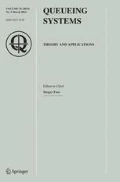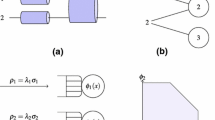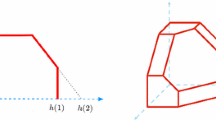Abstract
Generalized processor sharing has been proposed as a policy for distributing processing in a fair manner between different data classes in high-speed networks. In this paper we show how recent results on the Skorokhod Problem can be used to construct and analyze the mapping that takes the input processes into the buffer content. More precisely, we show how to represent the map in terms of a Skorokhod Problem, and from this infer that the mapping is well defined (existence and uniqueness) and well behaved (Lipschitz continuity). As an elementary application we present some large deviation estimates for a many data source model.
Similar content being viewed by others
References
D. Anick, D. Mitra and M.M. Sondhi, Stochastic theory of a data-handling system and multiple sources, Bell Syst. Tech. J. 61 (1982) 1871-1894.
H. Chen and A. Mandelbaum, Discrete flow networks: Bottleneck analysis and fluid approximations, Math. Oper. Res. 2 (1991) 408-446.
P. Dupuis and R.S. Ellis, A Weak Convergence Approach to the Theory of Large Deviations (Wiley, New York, 1997).
P. Dupuis, R.S. Ellis and A. Weiss, Large deviations for Markov processes with discontinuous statistics I: General upper bounds, Ann. Probab. 19 (1991) 1280-1297.
P. Dupuis and H. Ishii, On Lipschitz continuity of the solution mapping to the Skorokhod problem, with applications, Stochastics 35 (1991) 31-62.
P. Dupuis and A. Nagurney, Dynamical systems and variational inequalities, Ann. Oper. Res. 44 (1993) 9-42.
P. Dupuis and K. Ramanan, Convex duality and the Skorokhod Problem, LCDS Technical Report 96–5, Brown University (1996).
M.I. Freidlin and A.D. Wentsell, Random Perturbations of Dynamical Systems (Springer, New York, 1984).
J.M. Harrison and M.I. Reiman, Reflected Brownian motion on an orthant, Ann. Probab. 9 (1981) 302-308.
P.-L. Lions and A.-S. Sznitman, Stochastic differential equations with reflecting boundary conditions, Commun. Pure Appl. Math. 37 (1984) 511-553.
N. O'Connell, Large deviations for queue lengths at a multi-buffered resource, Technical Report HPL-BRIMS-96-010, BRIMS, Hewlett-Packard Labs, Bristol, England (1996).
I.C. Paschalidis, Large deviations in high speed communication networks, Ph.D. thesis, MIT, Cambridge, MA (1996).
A. Shwartz and A. Weiss, Large Deviations for Performance Analysis: Queues, Communication and Computing (Chapman and Hall, New York, 1995).
Z.L. Zhang, D. Towsley and J. Kurose, Statistical analysis of the generalized processor sharing scheduling discipline, IEEE J. Selected Areas Commun. 13 (1995) 1071-1080.
Author information
Authors and Affiliations
Rights and permissions
About this article
Cite this article
Dupuis, P., Ramanan, K. A Skorokhod Problem formulation and large deviation analysis of a processor sharing model. Queueing Systems 28, 109–124 (1998). https://doi.org/10.1023/A:1019186720196
Issue Date:
DOI: https://doi.org/10.1023/A:1019186720196




